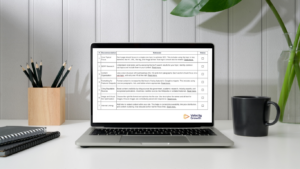ios17 will have an impact on Google Search.
But not as big of an impact as many originally predicted, at least so far.
Apple rolled out iOS 17 earlier this week, which includes major new privacy changes that will impact tracking and measurement for all digital marketing campaigns. If you’re running paid search campaigns, here is a summary about the steps recommended to ensure your Google Ads campaigns continue performing well.
The two big changes are:
Link Tracking Protection
Apple is removing click IDs and other user-level parameters from URLs when users browse privately in Safari or click links in Mail and Messages. These parameters are typically inserted by Google, Facebook, and certain affiliate platforms to monitor users’ activity throughout their purchasing journey.
By removing these parameters, Link Tracking Protection makes it more challenging for ad networks to track users’ online behavior.
Privacy Manifests
Apple is cracking down on “probabilistic attribution” used to match ad clicks with app installs. This will limit workarounds advertisers have used to track iOS app install conversions.
For your Google Ads campaigns, this primarily impacts our ability to optimize targeting and attribute conversions back to clicks automatically.
Here are the steps we are taking with our clients:
Stopping auto-tagging and manually tagging campaigns with utm parameters, using tracking templates. These parameters won’t be removed by Apple, allowing us to keep track of the conversion sources.
Here’s the tracking template we’re recommending:
{lpurl}?utm_source=google&utm_medium=cpc&utm_campaign={campaignid}&utm_content={adgroupid}&utm_term={keyword}
These changes can also impact other marketing campaigns you may be running, including other paid campaigns and potentially email campaigns.
Looking ahead, these iOS updates appear to signal a broader shift by Apple and Google towards phasing out user-level tracking and targeting in digital ads. Apple already restricted this for app install campaigns, and Google has announced similar plans to limit use of advertising IDs.
While iOS 17 takes a lighter approach for now, we expect user-level tracking on the web could face tighter controls in future iOS releases.
As user-level tracking becomes more restricted, first-party and zero-party data will be essential for personalizing marketing without compromising privacy.
First-party data like pages visited and items purchased can provide insights when collected ethically and with consent on your properties.
Zero-party data is information customers voluntarily share with you like email addresses, birthdays, and preferences.
Together, zero-party and consented first-party data offer a privacy-safe avenue for understanding customers and delivering tailored experiences across channels.
The brands that succeed will collect data responsibly, prioritize transparency, and give customers control, all while being successful still in this core channel.

Craig Zingerline is a 6 time founder who has helped dozens of companies scale their growth. Prior to Velocity Growth, Craig was the Chief Product Officer @ Sandboxx, Head of Growth at Upside Travel, CEO of Votion, Head of Growth at Red Tricycle, and VP at New Signature. In addition to in-house roles, Craig has advised and consulted with dozens of high growth startups (4 exits). He’s an award winning product strategist who has mentored hundreds of founders on growth, marketing, and product management.






